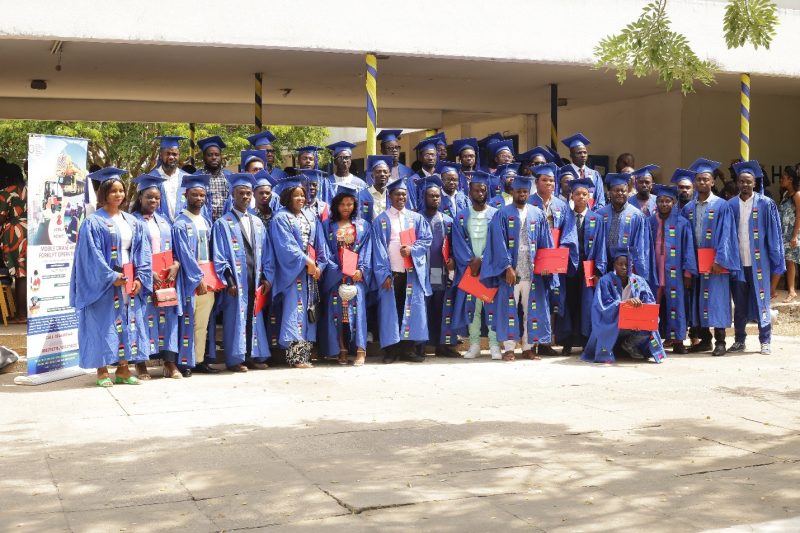

The Regional Maritime University (RMU) yesterday celebrated the achievements of the third batch of fifty-one (51) forklift and mobile crane operators marking a significant milestone in the collaboration between RMU and the National Association of Heavy-Duty Equipment Operators (NAHEOG). The ceremony not only recognized the successful completion of their training but also delved into the theme “Maximizing Labour Efficiency: The Role of Trade Associations and Professional Bodies.”
The Acting Vice Chancellor of the RMU, Dr. Jethro W. Brooks, revealed that since the inception of the memorandum of understanding (MoU) between RMU and NAHEOG, a total of 123 heavy-duty operators have been trained for the job market. The first batch comprised 26 graduates, followed by 46 from the second batch, and now an additional 51 skilled professionals from the third batch. This escalating number he explained, underscores the pressing demand for such expertise in the workforce.
“The theme of the event highlighted the vital role played by skilled workers, particularly forklift and mobile crane operators, in the contemporary industrial landscape. The efficient deployment of labor is identified as a cornerstone of organizational success” he opined, emphasizing the importance of well-prepared professionals to meet the evolving demands of industries.
Dr. Brooks also expressed gratitude towards the dedicated faculty, staff, and industry professionals who played pivotal roles in shaping the educational journey of the graduates.
Ing. Seth Ayim, Executive Director of the Institution of Engineering and Technology, who was the special guest of honor, highlighted the crucial role played by trade associations and professional bodies, specifically NAHOEG, as registered under the Engineering Council Act 2011, Act 819 in Ghana. He emphasized that these bodies serve as the backbone of the industry, providing vital support, fostering collaboration, and ensuring that the workforce is well-equipped with the necessary skills and knowledge.
The President of National Association of Heavy-Duty Operator Ghana, Mr. Dominic Kofi Eyiah, highlighted the crucial role of professional bodies and trade associations in the education, training and certification of professionals. These organizations he explained, serve as hubs for knowledge and learning, offering various training programs, workshops, and seminars to continuously develop individuals in different fields.
According to him, the certification they provide, such as the Professional Certificate of Competency (PCC), is renewable biannually, emphasizing the commitment to upskilling and staying current with the evolving technological landscape adding that this joint certification by the RMU and the association, specifically for Heavy-duty Equipment Operators, contributes significantly to ensuring professionals remain at the forefront of their industries.
According to Mr. Eyiah, beyond education and training ‘these organizations act as architects of industry standards, creating frameworks and guidelines that form the foundation of professional practices. Adherence to these standards streamlines operations and promotes cohesion within respective fields he said.
Mr. Eyiah also talked about the advocacy role undertaken by these organizations which he explained is crucial in influencing policies that shape the industry landscape, advocating for fair labor practices, workplace safety, and innovation-friendly regulations to harness skills to the fullest potential.
The ceremony concluded with a resounding call for graduates to actively engage with trade associations and professional bodies, leveraging the platforms offered for networking, knowledge exchange, and ongoing professional development. As the new professionals embark on their careers, their involvement with these associations is expected to contribute significantly to the collective growth of their industries.
SOURCE: MARKETING UNIT
